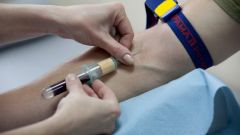Instruction
1
Human chorionic gonadotropin is a hormone that begins to produce in a woman's body during pregnancy. Before the concentration of HCG in the blood is only 0-15 honey\ml. Immediately after the implantation of a fertilized egg content of the hormone in biological fluids begins to grow rapidly.
2
Levels of human chorionic gonadotropin in the blood and urine are totally different. Increase in blood concentration can be detected much faster than in urine. If a woman is very important to diagnose pregnancy in the early stages, it can pass blood test. Diagnosis is possible in only a few days after fertilization.
3
Standard pregnancy tests in the form of strips, which must be dipped in urine, can be used only from the first day of menstruation, but not earlier. If you do analysis before, the probability of obtaining a false negative result.
4
There is a timetable for increasing the level of HCG in the blood within normal limits. It is believed that each week the concentration of gonadotropin should increase by approximately 2-3 times compared to its previous value. But this is only an approximate growth rate.
5
10-12 days of pregnancy the level of HCG in blood is 100-150 honey\ml. in a week this will increase to 200-400 honey\ml At 4-5 weeks of pregnancy, the concentration of the hormone in the blood should be 2560 — 82300 honey\ml.
6
The level of HCG grows rapidly during the first trimester of pregnancy. Around 12 weeks the growth rate slowed down, and at 16 weeks the concentration of the hormone remains unchanged or begins to decline.
7
If the growth rate of the concentration of HCG in biological fluids do not conform to the norm, this may indicate the presence of certain pathologies. For example, the slow growth of the levels of hormone in the blood can be a sign of ectopic pregnancy, as well as the existing threat of miscarriage. The decrease in the concentration of HCG in biological fluids during the first trimester of pregnancy may indicate fetal death.
Note
Blood to determine the level of HCG can be taken in the antenatal clinic. In most clinics it is paid.
Useful advice
Women who already have the sad experience of miscarriage, should be regularly to donate blood to determine the concentration of HCG. This will help to identify certain types of abnormalities in the earliest stages of their development.








